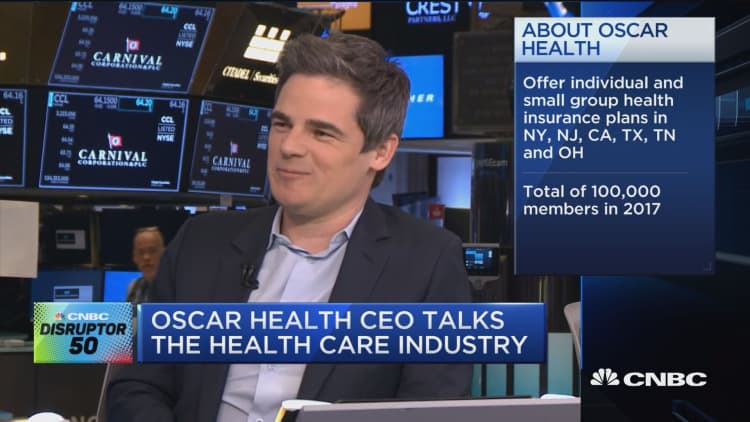
Oscar Health wants you to know that disrupting health insurance won't happen overnight. But it will happen eventually.
The start-up, which ranks No. 12 on the 2018 Disruptor 50 List and is now in its sixth year, believes it finally has the formula in place to become profitable and improve the health-care experience for its members.
It comes down to a mix of technology, provider partnerships and member experience.
Oscar distinguishes itself from much larger rivals, including UnitedHealth, with its millennial-focused subway ads and iPhone apps for members to book appointments and get advice from doctors. But it has also done a lot of work behind the scenes to build an entirely new infrastructure for core insurance functions, like provider directories and processing claims.
"It's a fairly simple thing," said Oscar's co-founder and CEO, Mario Schlosser. "We tried to do something complicated, and it took a long time to build the pieces to do it well."
"We've now built them, and they're clicking together," he added.
One major undertaking is a new system to process insurance claims.
Schlosser said it's a vast improvement from most claims processing systems, which are essentially cobbled together from 1970s programming tools.
Having its own infrastructure will allow it to do seemingly simple things that are often a struggle in the current health care systems, like paying doctors more for working peak hours like evenings and weekends, or giving members a clearer sense for how much procedures or tests will cost them.
The project, which has been going on for two years, comes off the back of Oscar's $165 million fundraise from a mix of venture capital firms, including two branches of Google's parent company Alphabet. That puts its valuation at more than $3 billion, one of the highest in the booming health-technology sector.
Stemming losses
A few years ago, many in the health industry had all but written Oscar off as another start-up struggling to crack the insurance market.
In New York alone, the company's home state, Oscar's losses amounted to $92.4 million in 2015 and more than $124 million in 2016. In that year, it made some big changes, including raising premiums and tightening up its network in various states, which helped it stem its losses in 2017.
The company expects a much better result this year, claiming that its revenues from premiums are now higher than its pay-outs in medical claims. It chalks that up to tight partnerships with health systems in each state, which allows it to push members towards a more curated list of high-quality, but affordable, medical providers.
More from CNBC Disruptor 50:
How we chose the 2018 CNBC Disruptor 50 innovators
23andMe founder Anne Wojcicki is leading a DNA revolution by going directly to consumersSilicon Valley tech bubble is larger than it was in 2000, and the end is coming
The company now claims more than $300 million in gross premiums in Q1, and says it's on track to pass $1 billion in revenue this year.
Throughout this year, it plans to grow at a rate of four to five cities per year, and is expecting to reach 260,000 members in 2018, up from a peak of 100,000 in 2017.
"Before you know it, we'll be profitable," Brian West, the company's chief financial officer, told us recently. "It's around the corner."
Fending off uncertainty
That growth might have seemed improbable just a year ago given the rising uncertainty about the fate of the Affordable Care Act. Back in 2016, many of the largest insurers started pulling out of selling on the individual market in many states, citing heavy losses. In the aftermath of that, the Trump Administration made repeated promises to rip out and replace Obamacare.
But Oscar defended the ACA and the long-term survival of the individual market, where it now sells its plans in six states. It chose to do that despite its tangled web of alliances: One of its founders, Josh Kushner, is the brother of Trump's advisor and son-in-law Jared Kushner.
These days, with the health legislation proving more resilient than expected, the company is able to focus on expansion.
It has dabbled in providing care and not just paying for it, with its first medical clinic in Brooklyn. It is also exploring other types of insurance, including selling to seniors through Medicare Advantage.
"Right now we are laser-focused on delivering a good experience and good cost outcomes, but we have the machinery that we can point at different markets," said Schlosser.








